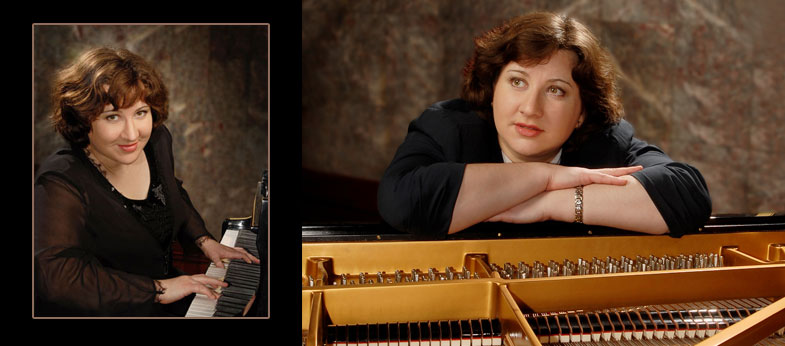

About
Invited to return because of her shimmering 2015 Steinway Society recital, Sofya Gulyak, at the 16th Leeds International Piano Competition (2009), became, and remains, the only woman awarded the First Prize and the Princess Mary Gold Medal. Her other prizes include First Prize of the William Kapell International, Maj Lind Helsinki International, and Tivoli (Copenhagen) competitions. She has since appeared to great acclaim all over the world.
A native of Kazan (Russia), she graduated with the highest distinction from École Normale de Musique de Paris and studied at the Royal College of Music.
She has appeared with countless renowned orchestras, including the London Philharmonic Orchestra, Halle Orchestra, Leipzig Philharmonic, and Orchestre National de France, and with renowned conductors including Vladimir Ashkenazy. Her festival appearances include Klavier Ruhr Festival, International Strasbourg Festival, Liszt Festival at Villa d’Este, and Festival Chopin in Paris, and radio and TV broadcasts in 13 countries.
She has taught master classes in China, Italy, Australia, New Zealand, Philippines and Hong Kong. She is a professor at London’s Royal College of Music and records for Champs Hill Records.
Program
Program Notes
As one of the first composers to create works specifically for the piano, Muzio Clementi is often regarded as the “Father of the Piano.” In order to take advantage of the instrument’s wide range of expression, Clementi is liberal with the technically difficult maneuvers such as jumps, runs and wide reaches. Clementi wrote more than 100 piano sonatas. Sonata Op. 33 No. 3 exhibits clear melodies that give the audience an opportunity to hear the pianist’s expressive abilities.
Just as Tchaikovsky extracted selections from his Nutcracker ballet to form the orchestral Nutcracker Suite, Mikhail Pletnev has arranged some of the music into a virtuosic concert suite for solo piano. Pletnev founded and conducted the Russian National Orchestra and is a Moscow Conservatory classically trained pianist. In addition to The Nutcracker, he has transcribed Sleeping Beauty, Prokofiev’s Cinderella, and Shchedrin’s Anna Karenina. This piano suite is sure to delight because it contains some of the ballet’s most famous excerpts: the March, Dance of the Sugar Plum Fairy, Russian Dance, Chinese Dance, and Pas de Deux.
Shostakovich reportedly wrote his 24 prelude-fugue pairs for each key in the chromatic scale soon after hearing a performance of Bach’s The Well-Tempered Clavier. Each of the 24 were composed in a matter of days. The Prelude and Fugue in D-flat Major was written in December of 1950, which could explain why the opening melody sounds like holiday music. The style is a brusque waltz, very typical throughout Shostakovich’s works.
A young contemporary of Rachmaninoff and Scriabin, Medtner composed only music that included the piano. Many of his solo piano works are referred to as skazki, meaning “tales,” as opposed to the specific class of fairy tales. These melodies are some of Medtner’s most original compositions. The Op 26 Tales were written between 1910 and 1912. The first tale is one of wonderment and magic, with light, wispy touches ringing in the high registers. The second takes on a more lively tone with quick and dynamic jumps down the keys before the third moves into dotted rhythms. The final tale is a bit more mischievous at times, building on different figures and tonalities.
Written and first performed in 1940, Prokofiev’s Piano Sonata No. 6 is the first of his Three War Sonatas, composed during World War II. The first movement, Allegro moderato, is filled with dissonance and unstable tonalities, and even the sonata form cannot keep everything in order. The main theme contains contrasting elements using A major and minor thirds, which is meant to add to the confusion of the piece. The Allegretto jumps around more and features staccato chords that allude to marching. The third movement provides some respite with a slow and romantic waltz before the fourth movement, in which the dissonant opening theme reappears and chaos remains.